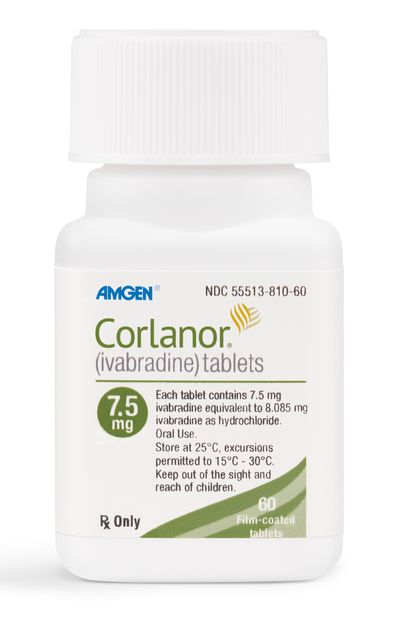FDA approves drug to fight heart failure

Patients with chronic heart failure, a disabling, deadly disease that worsens as the heart gradually pumps less efficiently, are getting a much-needed new option with U.S. approval of a novel drug from Amgen Inc.
Corlanor is the first medication in a dozen years for heart failure, which is becoming more common with obesity – and more people surviving heart attacks due to better treatments.
Meanwhile, the Food and Drug Administration is reviewing another heart failure pill, from Novartis AG, and could approve it this summer.
More than 5 million Americans and more than 25 million people worldwide have heart failure, which kills up to half of patients within five years, despite numerous generic pills and other treatments available. It costs the global economy an estimated $108 billion annually, mostly for repeated hospitalizations, so preventing those is a key cost-control target.
For most patients, it’s a chronic condition, caused by high blood pressure or other factors damaging heart muscle. That leaves many patients with “low-ejection fraction,” meaning the heart’s main pumping chamber can’t push out anywhere near the 50 percent or more of blood a healthy heart ejects.
Symptoms include breathlessness, fatigue and fluid retention. That keeps many patients homebound and causes repeated emergency department visits, often in the middle of the night, due to infections or just straying from a low-salt diet.
“It’s not uncommon for these people to be hospitalized two to 12 times a year” because they’re so fragile, said Sean Harper, Amgen’s research and development head.
In patient tests the drugmakers funded, the new pills from Amgen, of Thousand Oaks, California, and Switzerland’s Novartis, the world’s biggest drugmaker by revenue, each made patients feel better and significantly reduced hospitalizations and deaths from heart failure.
“Both drugs benefited patients with ejection fraction less than 35 percent,” said Dr. Mary Norine Walsh, an American College of Cardiology vice president who oversees heart failure treatment and cardiac transplantation at St. Vincent Heart Center in Indianapolis.
She said doctors and patients await the new medicines, which work differently and target slightly different patient subgroups, with some overlap.
“The No. 1 thing is going to be how expensive” the drugs are and whether insurers set high copays – if they even cover them, Walsh stressed. “When we say to a patient that we’ll replace your medicine that you can get for $4 (as a generic), nonmedical decision-making will come into play.”
Amgen says Corlanor’s list price will be $375 per month, without insurance. Novartis hasn’t set its drug’s price yet.
After Corlanor’s approval was announced late Wednesday, its shares rose $2.94, or 1.8 percent, to $168.41 in after-hours trading. They rose $2.90 in regular trading.
The FDA, which gave Corlanor priority review because of the need for better heart failure treatments, noted that women taking it shouldn’t become pregnant because of risk of harm to a fetus.
Corlanor, known chemically as ivabradine, reduces heart rate. It was tested on patients with low ejection fraction, 35 percent or less, whose hearts pump too fast, over 70 beats per minute. They were also taking common blood pressure drugs, including beta blockers and ACE inhibitors.
Half the 6,500 participants got Corlanor, the other half dummy pills. Corlanor reduced both hospital admissions and deaths from worsening heart failure about 25 percent.
The Novartis drug, called LCZ696, combines its off-patent blood-pressure blockbuster Diovan with a new drug that decreases certain heart-damaging proteins in the blood.
It was tested on patients with ejection fraction of 40 percent or less who took standard heart-failure drugs. Half the 8,400 patients got LCZ696; the other half got enalapril, a generic ACE inhibitor. LCZ696 reduced hospitalizations for heart failure and death from heart disease about 20 percent more than enalapril.
Amgen’s Corlanor has been sold under a different name in Europe since 2005 for angina, or heart pain, and since 2012 for heart failure.
Its French developer, Les Laboratoires Servier, doesn’t operate in the U.S. So Amgen acquired rights to U.S. sales cheaply, swapping the rights to European Union sales of an Amgen drug and giving Servier $50 million, plus payments from eventual U.S. Corlanor sales.
“It looks like it’s going to help a good number of heart failure patients” here, said UBS Securities biotech analyst Matthew Roden. “Heart failure is a rapidly growing category (that) definitely needs additional options.”
Roden conservatively estimates Corlanor will bring Amgen $330 million in sales in 2019, peaking a couple of years later at $350 million to $500 million.
He said it helps Amgen branch out from its strengths in cancer and inflammation drugs to cardiovascular drugs, so its sales reps will have relationships with heart doctors before Amgen’s Repatha is approved. That’s part of a pricey new class of cholesterol drugs under review for patients not helped enough by older drugs like statin Lipitor. Repatha and a rival pill could get U.S. approval this summer and eventually rack up billions each annually.
Amgen’s cardiac strategy is good news for patients. Many major drugmakers dropped heart disease research a decade ago, knowing most conditions had good treatments and their drugs would soon face cheaper generic rivals.